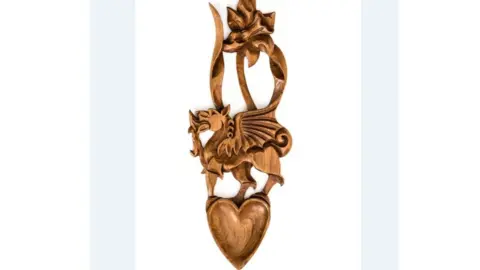Rugby World Cup: Rhys Carre's love spoon task
Rugby players are usually known for robust tackling on the pitch - but one Welshman is spreading a bit of love at the World Cup.
And it comes in an unlikely form - as he carries a giant wooden love spoon.
Wales' youngest player in Japan, Rhys Carre, 21, has explained to bemused journalists and locals about the carved piece of wood he has with him.
"It is tradition for the youngest player of the team to walk around with this at all the events," he said.
"The person who made it wanted to show their love for our country."
But it is a Welsh gesture of love that pre-dates not just the tournament but rugby itself, going back 400 years.
The prop, who has joined the English club Saracens, says the feathers represent "the fighting men", the harp "the singing voices" and the daffodil "the national emblem".

The former Cardiff Blues star said he was "honoured" to have the spoon, but had already mislaid it a few times.
"The only problem is I think the rest of the boys like to hide it from me," he explained.
It falls on the youngest member of each squad to carry the spoon around - with Dragons centre Tyler Morgan entrusted with it during the last World Cup.
However, the gesture goes far beyond a tour ritual.
Ruth Jones, who teaches the history of love spoons to tourists in Llangollen, Denbighshire, said: "It is a tradition that goes back to the 17th Century, back to when the men of Wales could not read or write.
"The love spoons were a token of their love and affection."
 Ruth Jones
Ruth JonesShe described the bowl as being a "pledge of love" and on the handle is a "letter or poem".
"The spoon symbolises a friendship we are taking from Wales to Japan and extending it to everyone we meet," she added.
Details on love spoons can include a Celtic cross symbolising two people together for eternity, a Celtic knot to show their lives intertwined, or a ball and cage to show parents' arms protecting a child for those expecting a baby.
Ms Jones added: "When people were carving, they were trying to say something.
"It started off as something very simple, but then began to tell a poem or story to the person they were giving it to.
"It was like a map of your life together."
Unique to Wales
The spoons were made from sycamore wood, with other symbols such as the daffodil representing how love would "blossom and grow" like the flower and the harp to show "there will always be harmony".
"It has endured because they have been so beautifully done," Ms Jones added.
"It's unique to Wales and when people see them, at first, they say how lovely they are and then they get to learn about the history and the sentiments behind it."
Ms Jones described it as "a dying art" with only a handful of people still making them because they are difficult to craft.
However, on the other side of the world, Wales' youngest rugby player is keeping one of the country's oldest traditions alive.